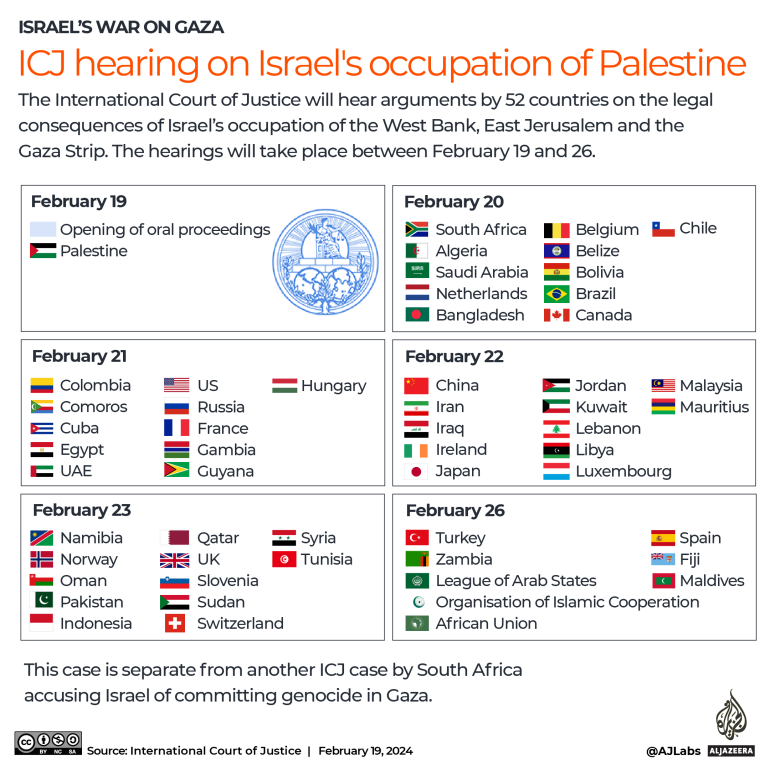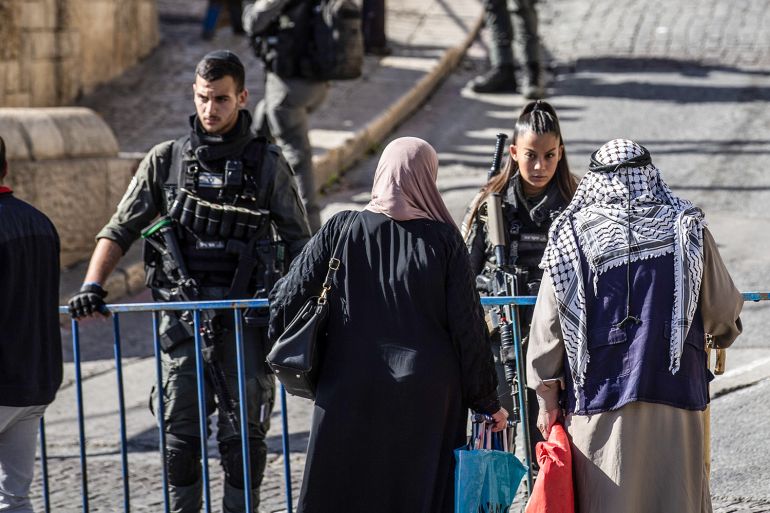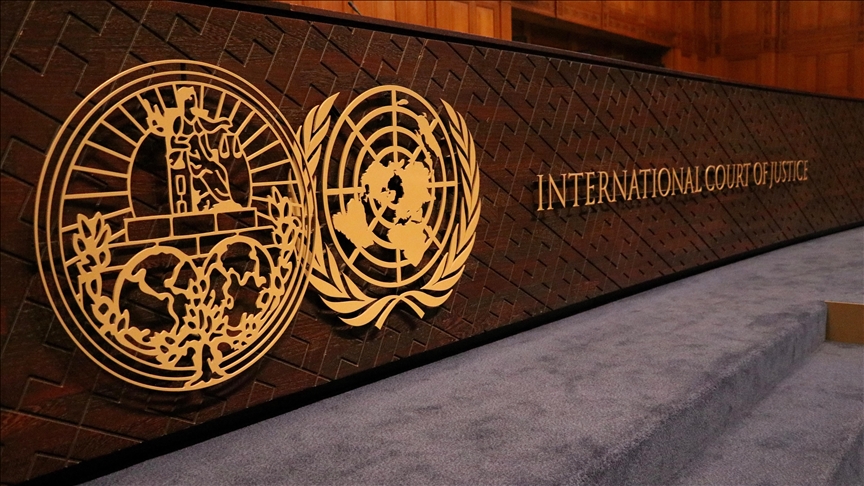What’s the ICJ Case against Israel’s Illegal Occupation of Palestine?
UNITED NATIONS, 26 Feb 2024
Al Jazeera - TRANSCEND Media Service
The International Court of Justice will hear 52 countries on the legal consequences of Israel’s occupation of the West Bank and East Jerusalem.
In a first-of-its-kind case, at least 52 countries will present arguments on controversial Israeli policies in the West Bank, the Gaza Strip and occupied East Jerusalem. It’s the largest number of parties to participate in any single ICJ case since the court was established in 1945.

Israeli authorities, since 1967, have illegally occupied the West Bank and East Jerusalem – part of Palestine under the United Nations-determined division of historic Palestine in 1948 – running a system that restricts the citizenship rights of Palestinians, hampers their free movement and strips them of ancestral lands. Between 1967 and 2005, Israel also directly occupied Gaza, and since 2007, has imposed a land, sea and air blockade on the coastal enclave. It decides what food, water, medicines, fuel, construction material and other commodities can go into Gaza, and stops their flow when it wants.
Even as the war on Gaza is now in its fifth month, Palestinians in the West Bank have come under increased attacks from Israeli forces, with hundreds of people killed.
In a statement last week, the ICJ said oral arguments in the case would last for about a week, during which all countries, as well as three international organisations, are expected to state why they support or oppose Israel’s measures. Tel Aviv has declined to present, choosing to submit a written argument instead. A court ruling is likely in several months.

[Mostafa Alkharouf/Anadolu via Getty Images]
Here’s all you need to know about the case:
Who brought the case against Israel?
The case was triggered by a request from the UN General Assembly (UNGA) on December 30, 2022, when a majority of members voted to seek the court’s opinion on the legal consequences of the continuing Israeli occupation of Palestine. Arab countries, Russia and China voted in favour of the move, while Israel, the US, Germany and 24 others voted against it.
During the Six-Day War in 1967, Israel occupied East Jerusalem and the West Bank, which were formerly under Jordanian control, and with an Arab-majority population. Most countries and the UN still view occupied East Jerusalem as the capital of a future Palestinian state, and regard Israel’s occupation as illegal under international law.
In a long missive to the ICJ, signed by UN Secretary-General Antonio Guterres, the UNGA asked judges to answer questions about how the rights of Palestinans are being affected by the occupation and continuing attempts to displace them, as well as what the responsibilities of the UN and its member states were in the face of those violations.
“What are the legal consequences … from the ongoing violation by Israel of the right of the Palestinian people to self-determination, from its prolonged occupation, settlement and annexation … aimed at altering the demographic composition, character and status of the Holy City of Jerusalem, and from its adoption of related discriminatory legislation and measures?” the UNGA missive asked.
The UNGA asked the court to answer those questions using a combination of international humanitarian laws, as well as the Charter of the United Nations and various UN resolutions. According to Human Rights Watch, Israel’s policies in the occupied territories amount to apartheid and persecution, both crimes against humanity.
The Hague-based court hears and adjudicates on matters between states, and it’s the second time it will weigh in on Israel’s illegal occupation. In 2004, the ICJ ruled that Israel’s ‘barrier wall’ in the West Bank that separates many Palestinian families, is illegal and should be dismantled. However, Israel rejected the ruling, and has since extended the wall.

(Bab al-Asbat) [Mostafa Alkharouf/Anadolu via Getty Images]
What countries will participate?
The oral hearings will last from Monday, February 19, until Monday, February 26.
A total of 52 countries – about 10 a day – will present their arguments to ICJ judges through the week. A majority of them originally voted in favour of the UN decision to approach the ICJ. A few, like Canada, voted against, while Switzerland abstained from the vote.
Legal teams representing the State of Palestine will kickstart the hearings on Monday. On Tuesday, South African and Canadian teams will be among the speakers. The US, China and Russia will take the floor between Wednesday and Thursday, while the Maldives will wrap up the final presentation.
Three multilateral organisations will also make their cases in the proceedings: the League of Arab States, the Organisation of Islamic Cooperation and the African Union.
So this is different from South Africa’s ICJ case against Israel?
It is. This case is separate from another ICJ case by South Africa on December 29 that alleges that Israel is committing the crime of genocide in Gaza in its continuing war on the Strip.
In a preliminary ruling in that case, the court ordered Israel to prevent and punish incitement to genocide, and to provide needed humanitarian aid by February 26.
The case whose hearings start on Monday, is not linked directly to the current war that Israel is waging on Gaza, though it pertains to many of the concerns of international law violation that bind Tel Aviv’s approach to all Palestinian territories.
What might the court’s ruling be?
The ICJ is composed of 15 judges from different parts of the world, elected by the UNGA for nine-year terms. Justice Nawaf Salam of Lebanon currently leads as president.
Judges will listen to the extensive presentations and publish a written opinion afterwards. It is unclear when the opinion will be released, but the ICJ’s processes are painstaking and usually take time. Some law experts say the opinion might surface before the end of the year.
It’s hard to predict what the court might opine exactly in this case, or even how the opinion would be worded. The ICJ has ruled against Israel in the past, such as over the West Bank wall in 2004, and the recent provisional measures ruling in January that many experts say Israel can only adhere to by effectively ending its war on Gaza.
When it does surface though, the court opinion will not be binding on the Security Council or Israel, meaning they don’t have to be enforced. However, experts say an opinion from the ICJ carries heavy weight and could add more pressure on Israel and its staunchest ally, the United States, to conform to international law.
Go to Original – aljazeera.com
Tags: Colonialism, Crimes against Humanity, Gaza, Genocide, Genocide Convention, International Court of Justice ICJ, Israel, Israeli occupation, Massacre, Palestine, USA, United Nations, War crimes, West Bank
DISCLAIMER: The statements, views and opinions expressed in pieces republished here are solely those of the authors and do not necessarily represent those of TMS. In accordance with title 17 U.S.C. section 107, this material is distributed without profit to those who have expressed a prior interest in receiving the included information for research and educational purposes. TMS has no affiliation whatsoever with the originator of this article nor is TMS endorsed or sponsored by the originator. “GO TO ORIGINAL” links are provided as a convenience to our readers and allow for verification of authenticity. However, as originating pages are often updated by their originating host sites, the versions posted may not match the versions our readers view when clicking the “GO TO ORIGINAL” links. This site contains copyrighted material the use of which has not always been specifically authorized by the copyright owner. We are making such material available in our efforts to advance understanding of environmental, political, human rights, economic, democracy, scientific, and social justice issues, etc. We believe this constitutes a ‘fair use’ of any such copyrighted material as provided for in section 107 of the US Copyright Law. In accordance with Title 17 U.S.C. Section 107, the material on this site is distributed without profit to those who have expressed a prior interest in receiving the included information for research and educational purposes. For more information go to: http://www.law.cornell.edu/uscode/17/107.shtml. If you wish to use copyrighted material from this site for purposes of your own that go beyond ‘fair use’, you must obtain permission from the copyright owner.
